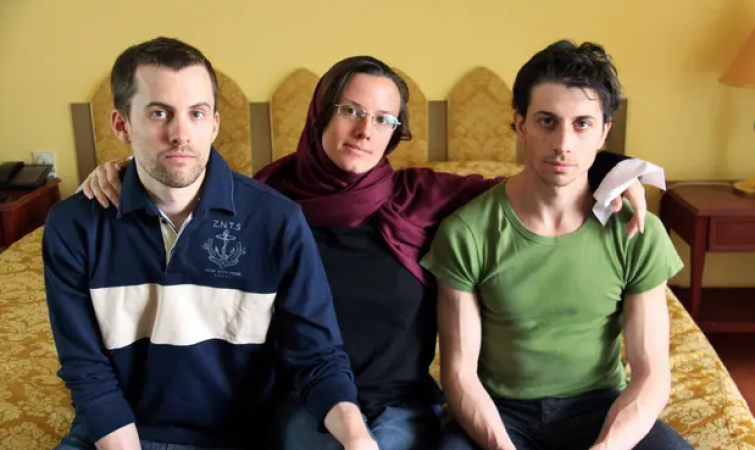
Iran: To persuade a judge to compensate him for the torture he was subjected to after being held captive by Iran for more than a year and accused of being a spy while hiking along the border with Iraq Three Americans are suing their former captives in the effort.
Federal Judge Richard Leon in Washington is overseeing a trial being brought by Sarah Schord, her ex-husband and fellow journalist Shane Bauer, and their friend Josh Fatal. Judge Leon in 2019 ordered Iran to pay $180 million to Washington Post journalist Jason Rezian for more than a year imprisoned on false espionage charges.
Iranian government assets that the US confiscated through sanctions as part of Congressional Justice for Victims of the State Sponsored Terrorism Fund are used to help Shard, Bauer, Fattal and their families receive through their trial. shall be liable to pay any damages.
The fact that Schord and Bauer, after being released, made a public statement protesting US sanctions against Iran, adds to the intrigue of a story that began in 2009. Such punishment, she said in 2016, "hit the poorest of Iranians hardest," and she agreed.
An email seeking comment was not immediately answered by the former couple or Fattal's lawyers, nor was it answered by the Pakistani embassy in Washington, DC, which is Iran's representative in the US.
The lawsuit describes how Schord and Bauer, who were dating at the time, relocated to Yemen and then Syria in 2008 to continue honing their Arabic language skills, while Schord was active in anti-war activism and Bauer was a freelance journalist.
In July of the following year, Fetel paid him a visit and went with him to a famous tourist waterfall in Iraqi Kurdistan. They reportedly crossed into Iran without realizing it during that hike, and a group of soldiers they believed to be Iraqi stopped them and took their hiking supplies, cameras, purses and passports, according to the trial. Searched.
The pedestrians were dragged into a sport-utility vehicle by soldiers, who then drove them around for three days while the Americans feared the prospect of their imminent execution. He was eventually taken to the infamous Avin Prison in the capital, Tehran, while kept in small, bare cells.
According to the lawsuits, the prisoners were interrogated in a way that appeared to be an attempt to get them to admit that they were American spies. The question of whether Bauer worked for the American mercenary company Blackwater or whether he could have used his background as a journalist to produce newspaper articles for the Guards. Shard was asked if she had ever been to the Pentagon, which she had not, and whether she was on a mission for the US government.
Once a guard informed Bauer that he believed the American was not a spy. But, Guard continued, "it was up to the US government and the Iranian government to negotiate his release."
In their trial, the plaintiffs describe how they often heard other prisoners screaming while they were being tortured, fearing they would be next.
While in isolation, Bauer, Fattal and Schord all describe struggling to maintain their sanity. The lawsuit claimed that Bauer and Fattal were eventually placed in the same cell, but Schord was left alone and not given medical attention for breast lumps, precancerous cervical cells, or other health problems.
In response to Mahmoud Ahmadinejad's intervention, the Iranian government released the shord in September 2010, treating it as an act of mercy honoring the end of Ramadan.
A year later, Bauer and Fattal were reportedly freed courtesy of Ahmadinejad as he was getting ready to board a plane to New York to attend a United Nations General Assembly meeting. "All Americans join their families and friends in celebrating their long-awaited return home," the Obama White House said in a statement at the time.
All three spoke of having trouble adjusting to their lives in the US after returning due to post-traumatic stress symptoms. In 2012, Schord and Bauer, whose work has appeared in The New York Times and Mother Jones, married in California close to the ocean. They separated after seven years.
The attempt to bring Shard, Bauer and Fattal back alive was also said to have caused much distress to their family members.
In May, Shard and her mother filed a lawsuit against the Iranian government, alleging that the daughter was being held nothing but a political hostage and seeking damages for the suffering they had endured. In July, Fatal, his parents and his brother did the same. In August, Bauer followed suit, along with his sisters, parents and family.
As of Friday, no trial date had been scheduled and the Iranian government had not responded to their legal complaints.
Rezaian sued Iran's government in October 2016, but the Iranian government never responded. According to the Wilmer Hale law firm, which represented Rezaian, Leon heard the case without Iran before awarding him $30 million in compensatory damages and $150 million in punitive damages to deter the regime from ever acting similarly again.
After Iraqi Shiite cleric Sadr resigned from politics deadly clashes broke out in Baghdad
A behind-the-scenes book reveals the US-UK battle over Huawei 5G
Memorizing the September 11 attacks which forever altered the course of history